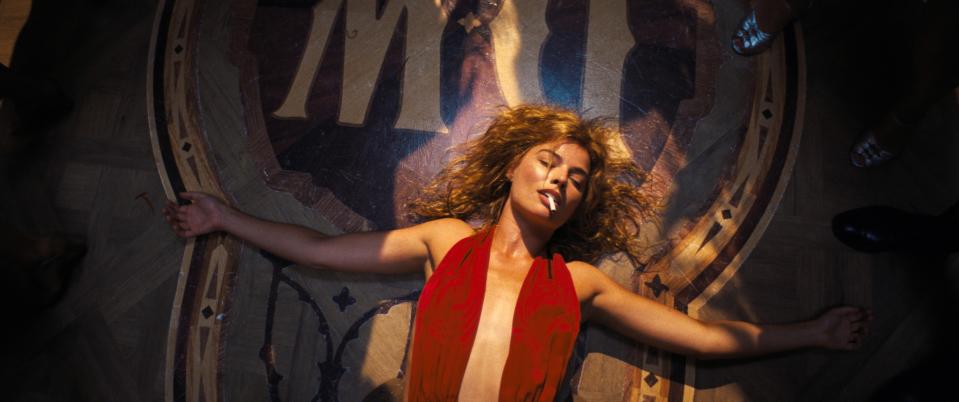Damien Chazelle is no historian, but he’s likely to change the way many people perceive the “wholesome” days of Old Hollywood with his star-studded, drug-fueled new excess-in-show-business odyssey, Babylon.
“The Old Hollywood that we have as a preconceived notion in our minds is this sort of tidy, elegant, sanitized, quainter world,” the La La Land and Whiplash director tells Yahoo Entertainment in a new interview. “In many ways, [that was] a manufactured delusion designed to cover up this kind of reality… But it was a free-for-all of drugs, of sexual liberties, of recklessness, transgressiveness of all kinds. It was an insane milestone of chaos, really.”
Babylon follows the intersecting stories of three people working in the 1920s film industry, just as silent movies are about to give away to “talkies,” changing the landscape forever. There’s Jack Conrad (Brad Pitt), a hard-partying, hugely famous silent movie star; Nellie LaRoy (Margot Robbie), an ingenue star who breaks out just before the transition; and Manny Torres (Diego Calva), an assistant who aspires to work his way up to producer.
They all cross paths at lavish Gatsby-on-speed parties thrown by studio exec types that include pulsating big band jazz, birthday suits, orgies, exotic animals and lots and lots and lots of cocaine.
[EMBED YOUTUBE INTERVIEW]
“It was new and, by all reports, it was the Wild, Wild West,” Pitt tells Yahoo. “An equal would probably be late-’60s rock-n-roll, early ’70s — that kind of Zeppelin-esque time that we hear about.”
“Pretty much everything you see onscreen is inspired, even if by a kernel, [by] something that happened,” Robbie adds. “So there’ll be a story that Damien’s read somewhere and then he kind of depicts it with fictional characters who are amalgamations of real-life people and real-life stories… But yeah, it sounded like a pretty debaucherous time.”
“It sounded like a really good time,” laughs Pitt.
“It was not PC at all,” adds Robbie.
Says Li Jun Li (the cabaret singer Lady Fay Zhu), “You have to remember, this is before we knew the dangerous side effects of doing so many drugs, and drinking… And moviemaking wasn’t taken as seriously back then. It was just a big ol’ fun time.”
Jean Smart (Hacks), who plays a sensationalist journalist with the power to make or break careers, says she was shocked when she first read Chazelle’s script. “I thought, ‘Oh, it couldn’t have been like this! It wasn’t all that long ago. But you don’t make movies about an average day or an average moment in somebody’s life. You make them about the highs and the lows.”
So what changed?
After the advent of sound, famously in 1927’s seminal film The Jazz Singer, the industry became more regulated, both off- and on-screen (most infamously with 1934’s Hays Code, which prohibited profanity, nudity and violence).
“These changes swept through it,” Chazelle says. “You see that as Hollywood becomes big enough, business starts making enough money that the polite society, the East Coast power centers, they can’t not pay attention. They can’t dismiss it. Then you start to see those kind of factors come into play … You see it get more regulated and codified, and the moral codes come in… Then you couldn’t show people sleeping in the same bed, or you couldn’t show a kiss that lasted more than 10 seconds. Those all came in the ’30s. They didn’t exist in the ’20s. And so in many ways, this movie for me became the story of how we got from A to B, how we got from the wild circus, the hard-R insanity of this to the much quainter, tamer, more suppressed Hollywood of the ’30s and later.”
The hard-R insanity is in full effect through Babylon’s 188-minute runtime, and the film’s debauchery and frenetic energy has surprised critics, who’ve offered some colorful early reactions. “Babylon works best when it feels like the people who made the movie were doing as much cocaine as the people they were making it about,” wrote Indiewire’s David Ehrlich.
The parties felt real, Pitt acknowledged
“It was hard not to feel [the manic energy],” Calva says. “It was just hard not to get so immersed into it.”
“And also [with] the sheer ambition of what everyone was trying to accomplishment, [we] were moving so fast,” Robbie says. “Which I think is why everything [has] a pretty heightened energy as well.”
“Damien was really brilliant in setting the scene for us, and just setting the environment,” says Jovan Adepo, who plays the trumpet player-turned-screen star Sidney Palmer. “You need that energy.”
[EMBED CHAZELLE TWITTER VIDEO]
Chazelle laughed when told of the “cocaine” comment.
“I’ll take it as a compliment, I guess,” he says. “It’s like the movie created its own drug, fever-dream energy, such that — and I’m not sure, maybe certain people were under the influence, but at least as far as I know, we were technically sober. But we were all getting high on the movie. We were all getting drunk and high as hell on just what was going on around us … You pack 300 people, half of whom are naked, into a room with music blasting, and you do it over and you’re in there all day long. You forget what hour of day it is. You sort of forget where you are.
“You disappear into that period. And you have someone like Margot Robbie dancing her head off, take after take. You’ve got Brad Pitt, you’ve got Jean Smart. You’ve got these sort of larger-than-life people in there, and you’ve got the band playing live. The whole thing kind of felt like a party. It felt like a circus.”
Babylon opens in theaters nationwide Dec. 23.
Watch the trailer:



